人教版(2019) 必修三 Unit 2 Morals and Virtues Listening and Speaking课件(共19张PPT,内镶嵌音频)
文档属性
| 名称 | 人教版(2019) 必修三 Unit 2 Morals and Virtues Listening and Speaking课件(共19张PPT,内镶嵌音频) |
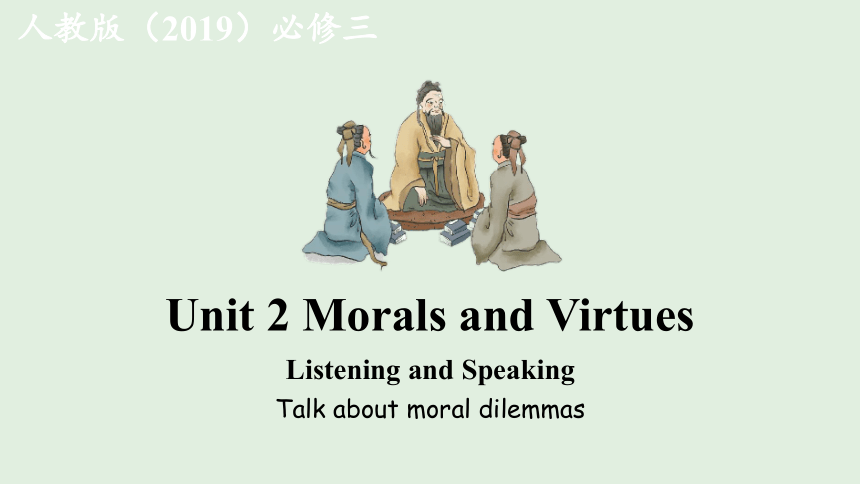
|
|
| 格式 | pptx | ||
| 文件大小 | 12.1MB | ||
| 资源类型 | 教案 | ||
| 版本资源 | 人教版(2019) | ||
| 科目 | 英语 | ||
| 更新时间 | 2023-08-17 13:17:13 | ||
图片预览

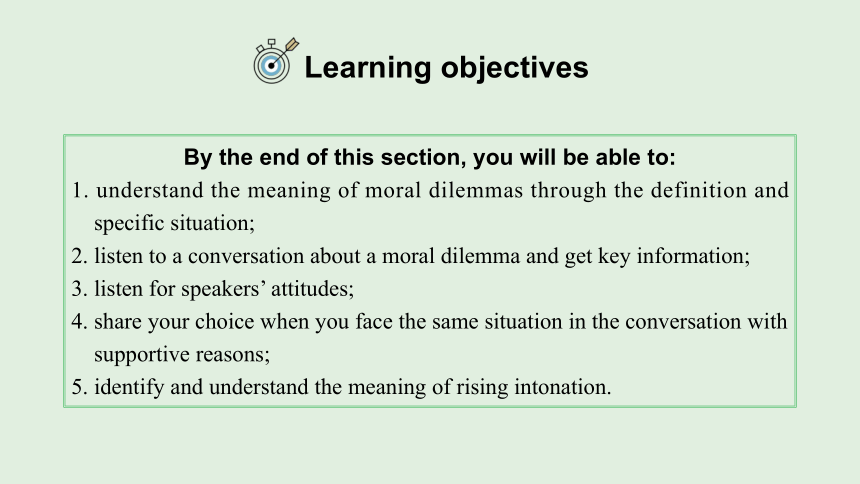

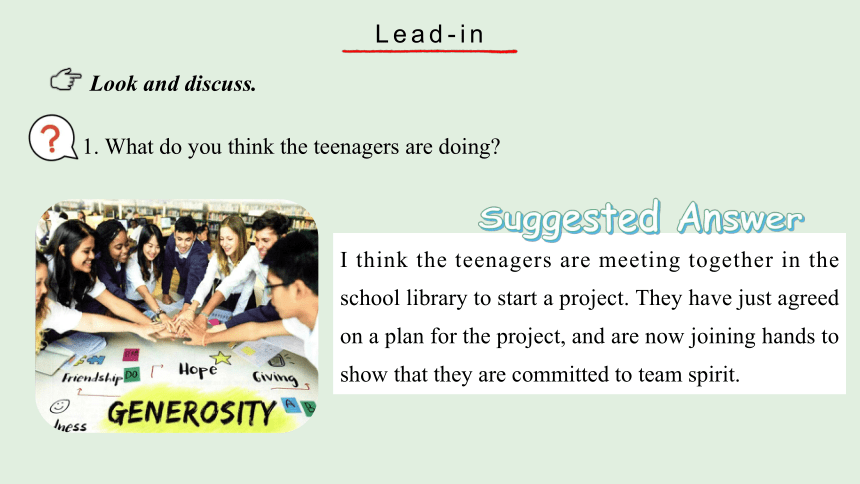
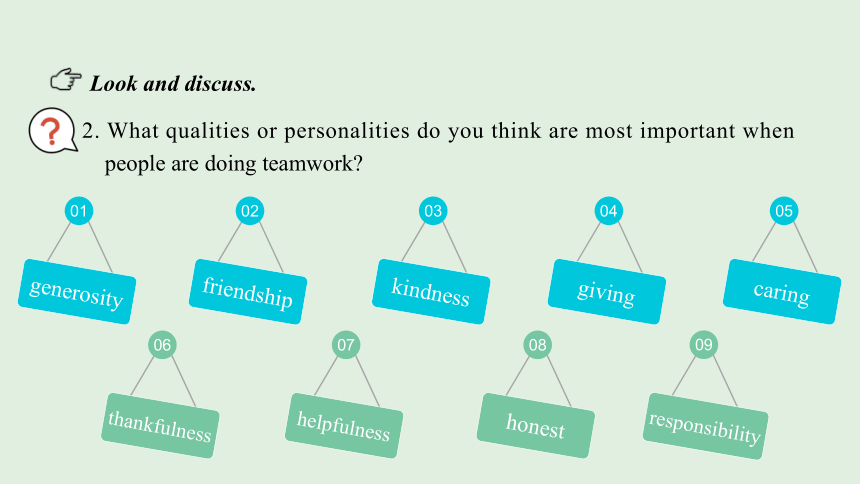
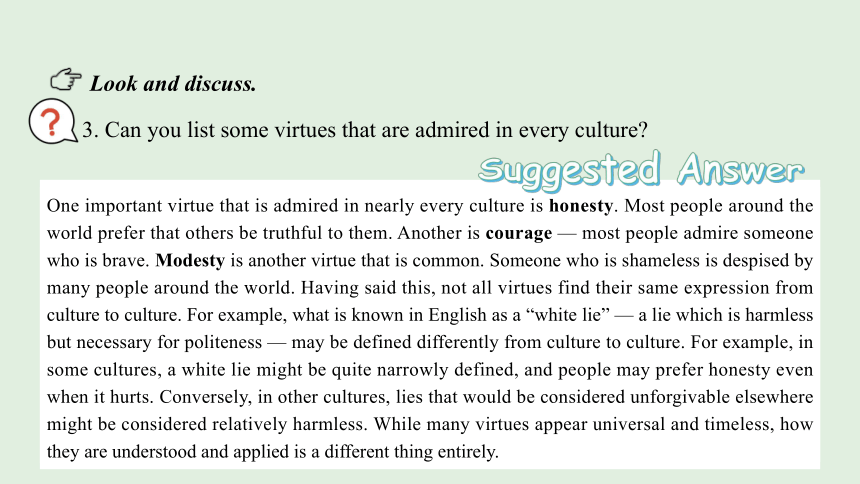
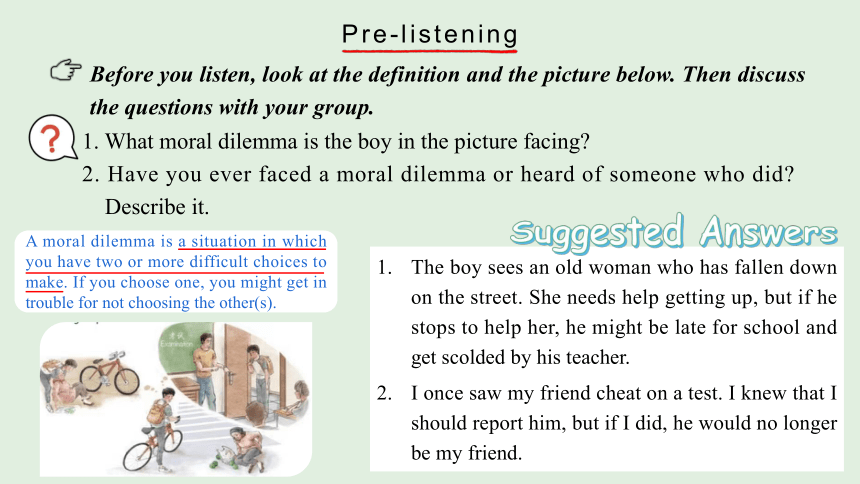
文档简介
(共19张PPT)
人教版(2019)必修三
Unit 2 Morals and Virtues
Listening and Speaking
Talk about moral dilemmas
Learning objectives
By the end of this section, you will be able to:
1. understand the meaning of moral dilemmas through the definition and
specific situation;
2. listen to a conversation about a moral dilemma and get key information;
3. listen for speakers’ attitudes;
4. share your choice when you face the same situation in the conversation with
supportive reasons;
5. identify and understand the meaning of rising intonation.
开篇页引用了英国诗人华兹华斯的《抒情歌谣集》(Lyrical Ballads)。呈现这一引言,正是为了让学生明白,美德往往“润物细无声”,体现在平凡生活的点滴之中,只有用心体会,才能发现道德和美德在社会生活中不可忽视的力量。
The best portion of a good man’s life is his little, nameless, unremembered acts of kindness and of love.
— William Wordsworth
一个好人一生最好的部分,是他细小的、无名的、不被人记得的出于善良和爱的行为。
——华兹华斯
Look and discuss.
Lead-in
1. What do you think the teenagers are doing
I think the teenagers are meeting together in the school library to start a project. They have just agreed on a plan for the project, and are now joining hands to show that they are committed to team spirit.
Suggested Answer
Look and discuss.
2. What qualities or personalities do you think are most important when
people are doing teamwork
generosity
01
friendship
02
kindness
03
thankfulness
06
helpfulness
07
honest
08
giving
04
responsibility
09
caring
05
Look and discuss.
3. Can you list some virtues that are admired in every culture
One important virtue that is admired in nearly every culture is honesty. Most people around the world prefer that others be truthful to them. Another is courage — most people admire someone who is brave. Modesty is another virtue that is common. Someone who is shameless is despised by many people around the world. Having said this, not all virtues find their same expression from culture to culture. For example, what is known in English as a “white lie” — a lie which is harmless but necessary for politeness — may be defined differently from culture to culture. For example, in some cultures, a white lie might be quite narrowly defined, and people may prefer honesty even when it hurts. Conversely, in other cultures, lies that would be considered unforgivable elsewhere might be considered relatively harmless. While many virtues appear universal and timeless, how they are understood and applied is a different thing entirely.
One important virtue that is admired in nearly every culture is honesty. Most people around the world prefer that others be truthful to them. Another is courage — most people admire someone who is brave. Modesty is another virtue that is common. Someone who is shameless is despised by many people around the world. Having said this, not all virtues find their same expression from culture to culture. For example, what is known in English as a “white lie” — a lie which is harmless but necessary for politeness — may be defined differently from culture to culture. For example, in some cultures, a white lie might be quite narrowly defined, and people may prefer honesty even when it hurts. Conversely, in other cultures, lies that would be considered unforgivable elsewhere might be considered relatively harmless. While many virtues appear universal and timeless, how they are understood and applied is a different thing entirely.
Suggested Answer
Before you listen, look at the definition and the picture below. Then discuss
the questions with your group.
1. What moral dilemma is the boy in the picture facing
2. Have you ever faced a moral dilemma or heard of someone who did
Describe it.
The boy sees an old woman who has fallen down on the street. She needs help getting up, but if he stops to help her, he might be late for school and get scolded by his teacher.
I once saw my friend cheat on a test. I knew that I should report him, but if I did, he would no longer be my friend.
Suggested Answers
Pre-listening
A moral dilemma is a situation in which you have two or more difficult choices to make. If you choose one, you might get in trouble for not choosing the other(s).
Listen to the conversation and complete the table to describe the moral
dilemma that Jane is talking about.
Situation The girl is taking the entrance examination for __________________ ___________ in Beijing. During the exam, the student next to her fainted.
The girl’s choices She can _______________ or She can ____________________
Possible results _____________________ _________, but ________ _____________________ ___________. _____________________________
___________, but ______________
_____________________________
_________.
a famous medical
university
finish the exam
stop and help the girl
She will get into medical
university
the girl
might not get the help
she needs
She can put the needs of the other
person first
give up her
chance to get into the medical
university
While-listening
Listen again and decide whether the statements are true (T) or false (F).
1. Jane is eager to share the magazine article with Luke.
2. Luke doubts that young people face moral dilemmas all the time.
3. Jane admires what the girl in the story did.
4. Luke doesn’t believe anybody would do what the girl in the story did.
5. Jane wonders how the girl became a doctor later.
Listen for attitudes
When you listen, you should pay attention not only to the words but also to HOW the speaker is talking. If people strongly disagree with something, they might exaggerate their intonation. If you hear people speaking very quickly or loudly, they may be excited or angry. If they speak slowly or stop often, they may be confused or not sure about what they are saying.
She carried the student to a safe place and looked after her. Then she went to the hospital with the student and called her sister.
Her name was Lin Qiaozhi. She later became a great doctor. She was famous for caring for tens of thousands of women and their babies.
Her life was full of hard choices, but she didn’t let them stop her from taking care of people who were in need. She always cared for others more than for herself.
Listen to the conversation carefully and answer the questions.
1. What did the girl do to help the student
2. What was the girl’s name What was she famous for
3. What did Jane say about the girl’s life
Suggested Answers
Luke: Hi Jane! What are you reading
Jane: Oh, hey, Luke! I’m reading a very interesting magazine article about moral dilemmas.
Luke: Moral dilemma What do you mean
Jane: You know, it’s when you have two choices, and you have to choose one, but for moral
reasons, sometimes it could be really difficult to decide.
Luke: Oh, situations like that don’t happen very often, do they
Jane: Actually, I think people face moral dilemmas all the time, even us students.
Luke: Really Like what
Jane: Well, for example, it mentions a girl who was taking the entrance exam for a medical
university in Beijing. During the exam, the student next to her fainted. The girl had a
choice. Should she finish the exam or should she stop and help the student
Luke: Surely the teachers would look after the student who fainted!
Transcript
Jane: Well, that’s what I thought — but not this girl. She stopped to help the student, thinking
that it was better to put the needs of the other person first.
Luke: So what happened to her exam
Jane: She never finished it. Instead, she carried the student to a safe place and looked after her.
Then she went to the hospital with the student and called her sister.
Luke: I can’t believe she would give up her chance to get into medical university! Who would
do such a thing
Jane: Well, that girl was Lin Qiaozhi. She later did get into medical university and then she
became a great doctor. She became famous for caring for tens of thousands of women
and their babies.
Luke: Oh, wow! So she became a doctor even though she left her exam that day!
Jane: Yes. Her life was full of hard choices, but she didn’t let them stop her from taking care of
people who were in need. She always cared for others more than for herself.
Transcript
Think about what you would do if you were ever faced with the same situation as the girl. Then share your thoughts with your group, and explain the reasons for your choice.
EXAMPLE
A: If I were ever in a situation like the
girl faced, I think I would choose to ...
B: Why Are you sure
A: Because I think that ... is most
important. What about you
B: I think I would ... I would...
Post-listening
Let’s review the rising intonation.
Pronunciation
When do we need to use the rising intonation
Listen to the conversations and match each rising intonation with its meaning.
Read the conversation and mark in the correct places. Then listen to the recording to check. Notice the meaning of each rising intonation.
Peter: It’s a nice day, isn’t it
Nick: Yes, but it looks gloomy to me.
Peter: Why What happened
Nick: You know Tony
Peter: Yes.
Nick: He asked me to write an essay for him. But I don’t think it’s the right thing to do.
Do you
Peter: No, it’s not.
Nick: But I’m afraid to lose him as a friend.
Nick: Well, good friends should help each other. But it doesn’t mean you should help him
cheat! Why not help him with his schoolwork
Nick: Good idea!
Words and Expressions
Morals and Virtues (P13) 道德与美德
virtue /'v t u / n. 高尚的道德;美德;优秀品质
搭配 by / in virtue of sth 凭借;依靠;由于;因为
例句
He led a life of virtue.
他过着高尚的生活。
She got the job by virtue of her greater experience.
她由于经验比较丰富而得到了那份工作。
拓展
virtue n. 优点;长处;用处 (SYN: advantage)
He was extolling the virtues of the Internet.
他赞扬了互联网的长处。
Role play conversation with your partners. Pay attention to the rising intonation.
Homework
人教版(2019)必修三
Unit 2 Morals and Virtues
Listening and Speaking
Talk about moral dilemmas
Learning objectives
By the end of this section, you will be able to:
1. understand the meaning of moral dilemmas through the definition and
specific situation;
2. listen to a conversation about a moral dilemma and get key information;
3. listen for speakers’ attitudes;
4. share your choice when you face the same situation in the conversation with
supportive reasons;
5. identify and understand the meaning of rising intonation.
开篇页引用了英国诗人华兹华斯的《抒情歌谣集》(Lyrical Ballads)。呈现这一引言,正是为了让学生明白,美德往往“润物细无声”,体现在平凡生活的点滴之中,只有用心体会,才能发现道德和美德在社会生活中不可忽视的力量。
The best portion of a good man’s life is his little, nameless, unremembered acts of kindness and of love.
— William Wordsworth
一个好人一生最好的部分,是他细小的、无名的、不被人记得的出于善良和爱的行为。
——华兹华斯
Look and discuss.
Lead-in
1. What do you think the teenagers are doing
I think the teenagers are meeting together in the school library to start a project. They have just agreed on a plan for the project, and are now joining hands to show that they are committed to team spirit.
Suggested Answer
Look and discuss.
2. What qualities or personalities do you think are most important when
people are doing teamwork
generosity
01
friendship
02
kindness
03
thankfulness
06
helpfulness
07
honest
08
giving
04
responsibility
09
caring
05
Look and discuss.
3. Can you list some virtues that are admired in every culture
One important virtue that is admired in nearly every culture is honesty. Most people around the world prefer that others be truthful to them. Another is courage — most people admire someone who is brave. Modesty is another virtue that is common. Someone who is shameless is despised by many people around the world. Having said this, not all virtues find their same expression from culture to culture. For example, what is known in English as a “white lie” — a lie which is harmless but necessary for politeness — may be defined differently from culture to culture. For example, in some cultures, a white lie might be quite narrowly defined, and people may prefer honesty even when it hurts. Conversely, in other cultures, lies that would be considered unforgivable elsewhere might be considered relatively harmless. While many virtues appear universal and timeless, how they are understood and applied is a different thing entirely.
One important virtue that is admired in nearly every culture is honesty. Most people around the world prefer that others be truthful to them. Another is courage — most people admire someone who is brave. Modesty is another virtue that is common. Someone who is shameless is despised by many people around the world. Having said this, not all virtues find their same expression from culture to culture. For example, what is known in English as a “white lie” — a lie which is harmless but necessary for politeness — may be defined differently from culture to culture. For example, in some cultures, a white lie might be quite narrowly defined, and people may prefer honesty even when it hurts. Conversely, in other cultures, lies that would be considered unforgivable elsewhere might be considered relatively harmless. While many virtues appear universal and timeless, how they are understood and applied is a different thing entirely.
Suggested Answer
Before you listen, look at the definition and the picture below. Then discuss
the questions with your group.
1. What moral dilemma is the boy in the picture facing
2. Have you ever faced a moral dilemma or heard of someone who did
Describe it.
The boy sees an old woman who has fallen down on the street. She needs help getting up, but if he stops to help her, he might be late for school and get scolded by his teacher.
I once saw my friend cheat on a test. I knew that I should report him, but if I did, he would no longer be my friend.
Suggested Answers
Pre-listening
A moral dilemma is a situation in which you have two or more difficult choices to make. If you choose one, you might get in trouble for not choosing the other(s).
Listen to the conversation and complete the table to describe the moral
dilemma that Jane is talking about.
Situation The girl is taking the entrance examination for __________________ ___________ in Beijing. During the exam, the student next to her fainted.
The girl’s choices She can _______________ or She can ____________________
Possible results _____________________ _________, but ________ _____________________ ___________. _____________________________
___________, but ______________
_____________________________
_________.
a famous medical
university
finish the exam
stop and help the girl
She will get into medical
university
the girl
might not get the help
she needs
She can put the needs of the other
person first
give up her
chance to get into the medical
university
While-listening
Listen again and decide whether the statements are true (T) or false (F).
1. Jane is eager to share the magazine article with Luke.
2. Luke doubts that young people face moral dilemmas all the time.
3. Jane admires what the girl in the story did.
4. Luke doesn’t believe anybody would do what the girl in the story did.
5. Jane wonders how the girl became a doctor later.
Listen for attitudes
When you listen, you should pay attention not only to the words but also to HOW the speaker is talking. If people strongly disagree with something, they might exaggerate their intonation. If you hear people speaking very quickly or loudly, they may be excited or angry. If they speak slowly or stop often, they may be confused or not sure about what they are saying.
She carried the student to a safe place and looked after her. Then she went to the hospital with the student and called her sister.
Her name was Lin Qiaozhi. She later became a great doctor. She was famous for caring for tens of thousands of women and their babies.
Her life was full of hard choices, but she didn’t let them stop her from taking care of people who were in need. She always cared for others more than for herself.
Listen to the conversation carefully and answer the questions.
1. What did the girl do to help the student
2. What was the girl’s name What was she famous for
3. What did Jane say about the girl’s life
Suggested Answers
Luke: Hi Jane! What are you reading
Jane: Oh, hey, Luke! I’m reading a very interesting magazine article about moral dilemmas.
Luke: Moral dilemma What do you mean
Jane: You know, it’s when you have two choices, and you have to choose one, but for moral
reasons, sometimes it could be really difficult to decide.
Luke: Oh, situations like that don’t happen very often, do they
Jane: Actually, I think people face moral dilemmas all the time, even us students.
Luke: Really Like what
Jane: Well, for example, it mentions a girl who was taking the entrance exam for a medical
university in Beijing. During the exam, the student next to her fainted. The girl had a
choice. Should she finish the exam or should she stop and help the student
Luke: Surely the teachers would look after the student who fainted!
Transcript
Jane: Well, that’s what I thought — but not this girl. She stopped to help the student, thinking
that it was better to put the needs of the other person first.
Luke: So what happened to her exam
Jane: She never finished it. Instead, she carried the student to a safe place and looked after her.
Then she went to the hospital with the student and called her sister.
Luke: I can’t believe she would give up her chance to get into medical university! Who would
do such a thing
Jane: Well, that girl was Lin Qiaozhi. She later did get into medical university and then she
became a great doctor. She became famous for caring for tens of thousands of women
and their babies.
Luke: Oh, wow! So she became a doctor even though she left her exam that day!
Jane: Yes. Her life was full of hard choices, but she didn’t let them stop her from taking care of
people who were in need. She always cared for others more than for herself.
Transcript
Think about what you would do if you were ever faced with the same situation as the girl. Then share your thoughts with your group, and explain the reasons for your choice.
EXAMPLE
A: If I were ever in a situation like the
girl faced, I think I would choose to ...
B: Why Are you sure
A: Because I think that ... is most
important. What about you
B: I think I would ... I would...
Post-listening
Let’s review the rising intonation.
Pronunciation
When do we need to use the rising intonation
Listen to the conversations and match each rising intonation with its meaning.
Read the conversation and mark in the correct places. Then listen to the recording to check. Notice the meaning of each rising intonation.
Peter: It’s a nice day, isn’t it
Nick: Yes, but it looks gloomy to me.
Peter: Why What happened
Nick: You know Tony
Peter: Yes.
Nick: He asked me to write an essay for him. But I don’t think it’s the right thing to do.
Do you
Peter: No, it’s not.
Nick: But I’m afraid to lose him as a friend.
Nick: Well, good friends should help each other. But it doesn’t mean you should help him
cheat! Why not help him with his schoolwork
Nick: Good idea!
Words and Expressions
Morals and Virtues (P13) 道德与美德
virtue /'v t u / n. 高尚的道德;美德;优秀品质
搭配 by / in virtue of sth 凭借;依靠;由于;因为
例句
He led a life of virtue.
他过着高尚的生活。
She got the job by virtue of her greater experience.
她由于经验比较丰富而得到了那份工作。
拓展
virtue n. 优点;长处;用处 (SYN: advantage)
He was extolling the virtues of the Internet.
他赞扬了互联网的长处。
Role play conversation with your partners. Pay attention to the rising intonation.
Homework
